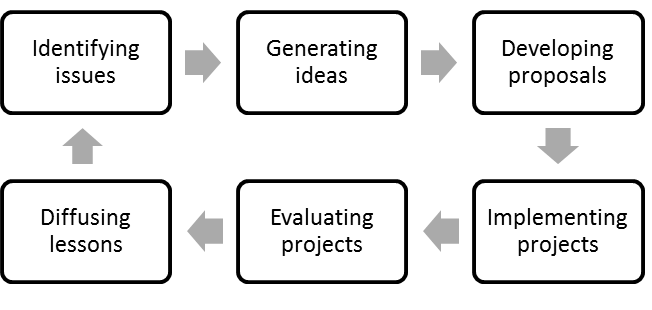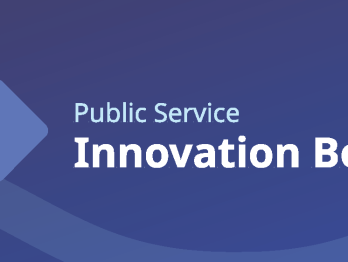Finding the Right Tools

How do you know why, when and how you should use a particular tool to get the best results?
I’m working on the development of an Innovation Toolkit for public servants and I want to hear from you about how you choose between methods, and what information you need when you are using a new approach.

Why an innovation toolkit?
The work of public servants is changing. Traditional methods no longer guarantee the same results they once did, so different approaches are needed.
But sometimes it can be hard to know alternative approach to use or when, especially if you have limited experience with it. Sometimes we need to use a new approach quite quickly without access to experts in the relevant method. Other times we face resource constraints making existing expertise unavailable. Or we may simply want to experiment with a new approach.
These and other reasons mean that public servants need on-demand access to tools and information on how and when to use them – in other words, a toolkit.
What toolkits already exist?
A number of countries have already developed toolkits. For instance Australia and the UK respectively have the Public Sector Innovation Toolkit and the Open Policy Making Toolkit, and France is in the process of developing their own. Some other countries have developed online courses for their public servants on innovation – for instance the ‘Innovations in the Government‘ course from the Mohammad Bin Rashid Center for Government Innovation in the UAE.
There are also a number of other potentially useful resources, innovation specific or innovation related, which are listed at the end of this post.
So if such resources exist, what more is needed? What will the OPSI Innovation Toolkit offer that’s not already available?
Well, we hope to build on existing work and offer value for governments and public servants in a number of ways.
First, we intend to base our guidance around the innovation lifecycle. Not every tool is useful at every stage of the innovation process. The use of some tools changes between stages. We hope to be able to offer a better understanding of which tools are useful when.
Second, we hope to draw on the lessons of multiple governments and the experiences of public servant practitioners from a wide range of contexts and settings. We want to understand what makes the use of a particular tool successful (or not), learning from as many people as we can, informed and illustrated by the case studies in the Observatory.
Third, it may be that the relevant information already exists – but sometimes too much information is worse than not enough. How can we help public servants navigate existing information and find out what is relevant for them, for their situation, for their needs, for their constraints and preferences?
Fourth, we want to help the ongoing sharing of lessons between countries and practitioners. Innovation is a changing practice. What works now may not in the future. A toolkit needs to be a living resource with ongoing ways of sharing and codifying lessons from practitioners. Each jurisdiction should be able to draw on the lessons and experiences of others.
So in essence we are seeking to develop a toolkit that will:
- provide public servants across different countries with the necessary knowhow for when and how to use different innovation tools, informed by real world examples
- provide senior officials and their organisations with a strategic appreciation of how to manage the stages of the innovation lifecycle in order to achieve novel responses to priority problems/issues.
To do this effectively we need to draw on the insight and experience of many innovation practitioners and public servants.
If you are interested in this work and in being involved – whether by sharing your experiences or sharing your views about what you think is needed in a toolkit – then you can sign up for our discussion group in LinkedIn. As a starting point, I would appreciate any suggestions about:
- existing guidance and toolkits that we might not be aware of
- the tools or methods you have found most useful (and when) for coming up with and implementing novel solutions.
Otherwise, if you would like to be kept informed about what happens with this project and our other projects in public sector innovation, then you can sign up to our mailing list.
Alternatively, please submit any comments or questions to the team by email.
Existing Toolkits / Knowledge Resources
- Public Sector Innovation Toolkit
- Open Policy Making Toolkit
- Federal Crowdsourcing and Citizen Science Toolkit
- Get Started with Challenge and Prize Competitions
- US Digital Service Digital Services Playbook
- Australian Digital Transformation Office Service Design and Delivery Process
- Tools for Leadership and Learning: Building a Learning Organisation
- Project Open Data
- U.S. Public Participation Playbook
- OECD Draft Digital Government Toolkit
- UNDP Global Centre for Public Service Excellence Evidence Hub
- GovLab – Network of Innovators – The skill-sharing network for government & civic innovators worldwide
- Open Governance Research Exchange (OGRX)
- Government Innovation – Applying the Bloomberg Philanthropies Approach to Drive Innovation in Cities
- i-teams: The teams and funds making innovation happen around the world
- Paper Prototyping: A Guide For Surfacing Innovative Ideas More Quickly
- Nesta DIY (Development Impact and You) Toolkit: Practical tools to trigger and support social innovation
- Nesta Innovation Tools and Resources
- Government Innovators Network – A forum for innovation in the public sector
- SpredningsGuiden (a guide for sharing or scaling innovations)
- Innovillage Innovation Model
- Deloitte “The innovator’s playbook: Nurturing bold ideas in government”
- If we can Put a Man on the Moon: Getting Big Things Done in Government by William D. Eggers and John O’Leary
- Service Design Toolkit
- Quality of Public Administration: A Toolbox for Practitioners
- CoLab Field Guide to Systemic Design
- TEN (The European Nudging Network)
- The Toolkit Project
- Design Method Toolkit
- IDEO Design Kit
- Service Design Tools
- Practical Service Blueprinting Guide
- Design Council “Design Methods for Developing Services”
- FutureGov “Shift: a Rough Guide to the Shift Surrey Approach”
Online Courses












